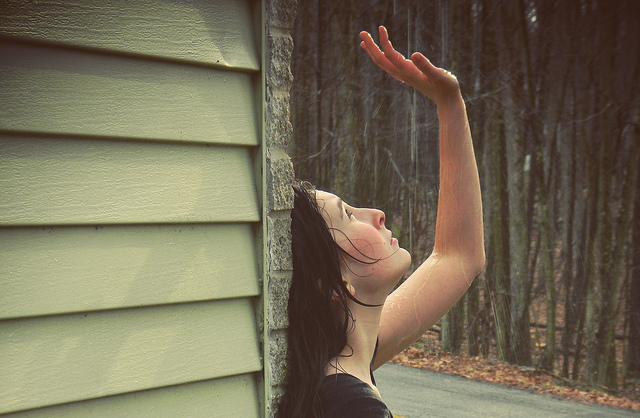**Author’s note: Girls with Asperger’s Syndrome are rarely written about and are also rarely diagnosed with the majority of people (including doctors) believing it is a male thing. Girls are falling through the cracks because they mask it so well through mimicking the behaviour of other girls around them. It’s a challenge I wanted to write about in order to bring awareness.
.
Surviving with our gifts intact.
Once upon a time, there was a little girl who felt safe enough at home to unleash everything she had kept in out there in the world—and there was so much out there!
There were people who were so rushed, opinionated and draining that the little girl often felt like an alien, like someone from somewhere else. It was so hard to try to fit in. She didn’t understand the feelings and contradictory words coming from the people around her.
She didn’t understand mind games and cruelty, and she didn’t understand teasing and mean-spiritedness. She didn’t understand the social nuances of those she spent the day with at school. She copied what the other girls did and said, because she didn’t know how to “act like” a girl. She didn’t know how to play their games. She spent so much time in her own thoughts that she found it extraordinarily hard to be social. It was like learning a foreign language for her.
Materials felt harsh to her skin, and she would have a meltdown. When she was young, she would kick and cry because the fabrics hurt her skin, but she didn’t have the words to say why she was so uncomfortable. She only knew that no one else seemed to feel or act like she did—and she couldn’t help it.
Everything was painful, except for her blanket whose fleece comforted her like nothing else could. That’s why she loved bedtime. She knew her blanket was waiting for her, and she could run her fingers over it like they were ice skating, and she would pretend they were. The motion would lull her to sleep.
Getting her hair cut was torture as the snippets fell onto her arm or onto her neck. She was often in tears as the hair fell, and then she would become very irritable after sitting for so long, anticipating the next few snips of hair that would stab her sensitive skin.
Water from the shower felt like a full-on assault, and all her energy was taken up from trying to deal with her senses being so heightened that living on this planet was a living hell at times—and how could she explain that to anyone?
How could they understand that her tears and outbursts were because of extreme physical discomfort?
Walking was hard because she would often misjudge the depth or height of things.
Every hour of every day held some challenge for her.
Changes in plans or people’s moods threw her. She was difficult and was called that often.
After all, who could make sense of a child like this?
She tried to act like everything was okay, but it wasn’t. She was holding it all in. The smell of her aunt’s kiss still on her cheek and not being able to wipe it away. The pebble in her shoe. How sick she felt in the car, even just going on a little drive—the sway and the curves of the road adding to her disorientation.
However, in the quiet moments, she spent hours looking into the glass eye of a toy owl, and she would imagine figures dancing.
She did this often, as a way to be in her own world.
And when she wasn’t doing this, she spent a majority of the time observing people discretely and realised she could feel what they felt. She knew what they were going to say before they said it.
That girl was me.
She might be a lot of people, actually—there are a quite a few of us out there.
We think, at some point in our lives, that we won’t survive this planet.
We’re wise, discerning and naive—all wrapped into one package.
We are also highly intuitive.
Since we were born with heightened senses to everything touching us—or noises seeming so loud, and voices sounding angry when they were just a little raised or excited—our other senses are also heightened.
And we don’t know where to go with those either.
Those of us with religious backgrounds are often condemned or shamed because we know things we shouldn’t have known. Our already sensitive natures can be devastated further by the inference that there is even more wrong with us than our sensory problems.
Here are some things that helped me cope:
1. I learned to tune out dogmatic opinion and get in touch with myself and my own heart. I learned that I had to be entirely alone after an outing—blissfully alone, and maybe I’d cry. That’s okay. I could lose myself in a bath or in a book for hours after having to be inundated by the noises and chaos of the world. It’s okay to use the time after a social function to regroup so you can function.
2. Getting to know myself. Get to know how to manage your internal world when the outside world makes no sense. Find quotes that speak to you, that cause that shift in your heart, from frightened and overwhelmed, to peaceful and comfortable. Words can bring us back to ourselves.
3. Have a routine as much as you can and be aware of what potential triggers you might have to face throughout your day. Pay attention to when the anxiety hits—and why—and write it down. If a person is the cause of your anxiety, make sure they know it’s part of your genetic makeup to be anxious when something changes.
4. Realising that my intuition was honed from years of observing and being mindful. It has has heightened in me what is inherent in everyone, but some of us are like the canaries in the mine. We know what’s going on before other people know.
5. It’s okay to melt down because of all the information and senses that assail you. You might rock yourself in a chair, no matter what your age. You might meditate or go for a walk in nature. You might need a bone-crushing hug—or no touch at all. We all know inherently what we really need.
6. Realising that we are not a burden, and not weak, is probably the biggest gift we can give ourselves. You can throw off the label “difficult,” and perhaps exchange it for “complex”—or for no label at all, but know this: you are a gift.
We can deduce, almost immediately, when someone needs our love and our kindness and our compassion.
We can relate to animals and small children because they, like us, have heightened senses. Maybe this could lead to a career.
We may not always be out in the world much, but our gifts of in-depth understanding can be shared and used to help others. Our voices, and sharing what we’ve learned, might be enough to help get someone through their day.
All my early sensory issues were awful challenges, but they are now manageable. There comes a point where we master those issues—even though they still exist—and we become craftspeople with words, or deeds, or our gifts, using them to help other people.
It’s hard—sometimes devastatingly so—but it’s doable.
We’re not weak. We’re a different kind of strong.
“I was made for another planet altogether. I mistook the way.” ~ Simone de Beauvoir
.
~
Author: Glynis Barr
Image: Flickr/martinak15
Editor: Yoli Ramazzina







Read 0 comments and reply